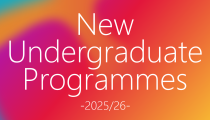Sept 2025 Entry
2 years
61
Preference will be given to students with good language skills.
What's New
Aims & Objectives
The Environmental Design programme aims to provide students with creative, professional skills and knowledge that are necessary for a successful career in the design industry that focuses on the spaces and settings that define the liveable environment.
The objective is to educate environmental designers to have a broad interdisciplinary view of their roles in programming and influencing the spatial and material settings of liveable cities.
Graduates are expected to cover a number of spatial fields in their design of the environment, forming crossovers between architects, interior designers, geographers, landscape designers, product designers and project developers.
Commencing from a spatial and architectural foundation, graduates will gain knowledge of how environmental design intersects with other spatial and technical disciplines including architecture, landscape, urban design, and planning policies and environmental technologists.
Characteristics
Is Environmental Design for you?
-
You have a passion for environmental design and technology, with a strong belief in the power of urban design / architectural design / landscape design to influence the ways we live.
-
You are culturally sensitive and have a fascination with how we interact with our physical environment.
-
You constantly think about ways in which the design of the environment can improve our lives and add to the diversity and interest of the cities where we live.
-
You are a conceptual thinker who has a strong sense of space and place.
-
You have a good understanding of three-dimensional context of settings and can express yourself in both three- and two-dimensional media.
-
You are an independent thinker and are self-driven but are also able to work with others in a team; you think flexibly and adaptably. You can communicate your ideas and thinking well in English.
The Environmental Design Programme is intended to prepare students for a career in the profession of spatial and environmental design industry primarily to provide service in Hong Kong and Mainland China at an international standard, for collaborations with global companies and organizations.
Additionally, it informs students of the need and possibilities of further education while preparing students for education at the post-graduate level.
Graduates of the BA (Hons) in Design (Environmental Design) are able to design at different scales and within a number of spatial systems, harnessing different disciplines that deal with the environmental design industry including interior design, interior architecture, spatial design, environmental data, set design, exhibition design, furniture and furnishing design, lighting design, urban space design, landscape and interior-scape design, and experience design.
Year 3 Pre-professional Collaborations
Students in the Environmental Design specialism are expected to locate their practice in historical, cultural and theoretical contexts. Working critically, students are challenged to integrate conceptual and technical skills for developing and communicating creative ideas, applying scales and systems of the environmental design within a professional context with pre-vetted practitioners and industry experts.
Year 4 Integrative Design
As an entry level of the environmental design profession, candidates are expected to work independently in the synthesis of theoretical, strategic, and creative thinking skills, with creation of innovative spaces and environmental systems. The year requires students to identify critical issues affecting the future of environmental improvement questing the link to other design fields or design systems that outlines a multidisciplinary project or team composition.
Senior Year students are required to complete a total of 61 credits in order to graduate.
Additional 3 to 9 credits of English and/or Chinese language subject(s) for students not meeting the equivalent standard of the Undergraduate Degree LCR.
More information can be found here.
61
Scheme Leader
Gerhard Bruyns
BSc (Arch) MSc Urbanism TUD, PhD TUD
Programme Leader
Daniel Elkin
MArch, BSArch
-
Applicants with an Associate Degree or a Higher Diploma in Design/Design Studies from a recognised institutions.
-
Applicants will be invited to submit design portfolios. Those who satisfactorily perform in portfolio submission will be invited for interviews with portfolio presentation.
For further programme information, please contact:
The General Office
Tel: 2766 5488; email: nicola.yau@polyu.edu.hk
Tel: 2766 4353; email: jennifer.lo@polyu.edu.hk
Required
Copies of public examination result slip(s) demonstrating applicants' English language proficiency, e.g. HKDSE, HKALE, HKCEE, IELTS, TOFEL, etc. (for reference only)
To understand the potential of applicants for the programme, and to ascertain whether their expectations match what the programme/career path can provide and to evaluate their language, communication and interpersonal skills.
About 10-15 minutes
Applicants are required to submit portfolios by early round and main round application deadline. Shortlisted applicants will be invited for individual interviews from November to April.





